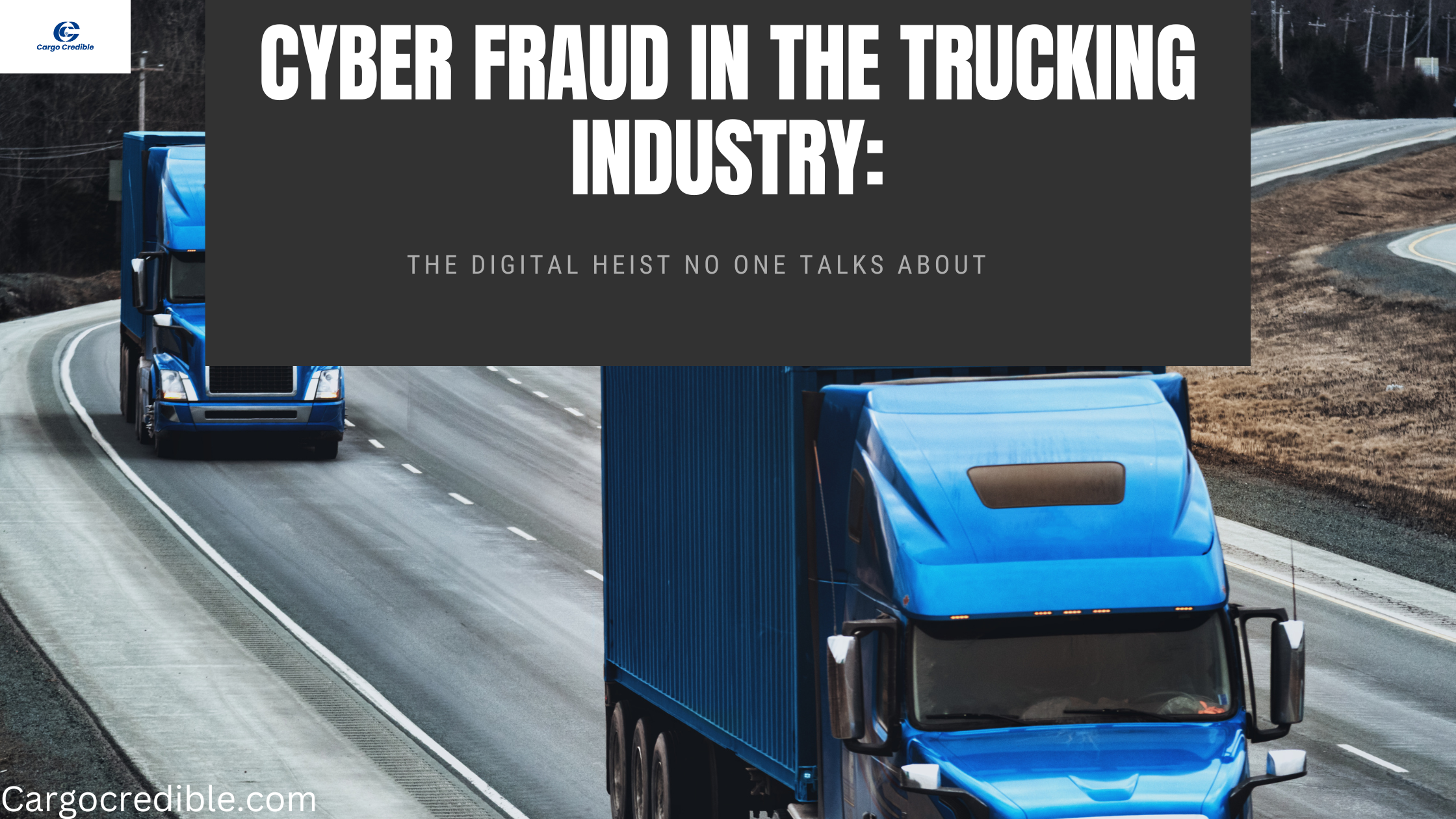Cyber Fraud in the Trucking Industry: The Digital Heist No One Talks About

The trucking industry has always been a key player in global trade, responsible for moving billions of dollars worth of goods every single day. But as technology in the industry advances, so do the threats that come with it. A growing danger, one that's often overlooked, is cyber fraud. This new type of crime is silently infiltrating trucking companies, stealing money, data, and even whole shipments without anyone even noticing.
In this blog, we’re going to take a closer look at cyber fraud in the trucking industry, how criminals are targeting the sector, and what companies can do to protect themselves.
What is Cyber Fraud in the Trucking Industry?
Cyber fraud in the trucking industry refers to any fraudulent activity that uses technology to exploit or attack trucking companies, drivers, and their systems. This could include anything from hacking into a company's payment system to tricking a driver into delivering a load to the wrong place using a fake broker. It's a digital crime that can cost companies hundreds of thousands of dollars without anyone ever laying a hand on a truck.
The Growing Threat: How Cyber Fraud Has Evolved
As more trucking companies rely on digital tools—such as GPS tracking, electronic logging devices (ELDs), and online load boards—cybercriminals have found new ways to target these companies. In the past, thieves physically stole freight, hijacked trucks, or broke into warehouses. Now, they don’t even need to leave their computers.
Common Cyber Fraud Schemes in Trucking
- Fake Freight Brokers & Load Board Scams
Cybercriminals often create fake profiles as brokers on load boards. These scammers will post fake loads, convincing trucking companies to transport goods. After the delivery, the fraudster disappears with the payment, leaving the driver unpaid.
- Hacked GPS & Fleet Tracking Systems
Many trucking companies use GPS tracking to monitor their fleets. But hackers have figured out how to gain access to these systems:
- They can reroute shipments to unauthorized locations, causing a loss of cargo.
- They may disable GPS tracking entirely, making it seem like the truck is lost.
- Stolen goods are then sold on the black market, and the cargo’s whereabouts are hidden.
- Payroll & Wire Transfer Fraud
Cybercriminals can hack into trucking companies' payroll systems and change the direct deposit details. Drivers stop getting paid, only to find out that their money has been transferred into someone else’s account.
- Cyberattacks on ELDs
ELDs are required to track drivers' hours and ensure compliance with federal regulations. However, hackers can exploit weak security in these devices:
- They may steal sensitive driver data, like CDL numbers, addresses, and Social Security numbers, which is then sold on the dark web.
- In extreme cases, hackers can lock companies out of their own systems and demand ransom.
- Phishing Scams & Email Fraud
Cybercriminals use phishing emails to trick trucking companies and drivers into giving away sensitive information:
- Scammers may impersonate trusted brokers, asking for payment updates or contract changes.
- Clicking on a malicious link can allow the hacker access to company systems, often leading to bigger financial losses.
The Economic Impact of Cyber Fraud in Trucking
Cyber fraud has a significant impact not just on individual trucking companies, but on the entire economy. Here's why it matters:
- Financial Losses
A single cyber fraud incident can result in hundreds of thousands of dollars lost. Whether it's from stolen cargo or hacked payment systems, these attacks cost businesses a lot of money.
- Reputational Damage
Companies that fall victim to cyber fraud often lose clients and partners. Once trust is broken, it’s hard to get it back.
- Legal and Compliance Risks
If personal data is stolen, companies might face lawsuits, fines, or penalties. Data protection laws are becoming stricter, and failing to protect customer data can lead to major legal trouble.
- Operational Disruptions
Cyberattacks can bring entire fleets to a halt. If a company’s systems are compromised, shipments could be delayed, and drivers may be stranded.
How to Protect Your Business from Cyber Fraud
It’s clear that cyber fraud in the trucking industry is a growing problem, but the good news is that there are steps trucking companies can take to protect themselves. Here’s how you can prevent becoming a victim:
- Strengthen Cybersecurity Measures
- Use multi-factor authentication (MFA) for all company logins.
- Keep all software, GPS systems, and ELDs up to date with the latest security patches.
- Avoid using public Wi-Fi without a Virtual Private Network (VPN), especially at truck stops.
- Verify Everything Before You Trust
- Research freight brokers and partners before accepting loads. Use verified load boards.
- Always double-check payment details and contact the company directly if you’re unsure.
- Educate Your Employees and Drivers
- Train your staff to spot phishing emails and fake invoices.
- Require drivers to use strong passwords and lock their mobile devices.
- Make cybersecurity a part of regular safety meetings and briefings.
- Invest in Cyber Fraud Protection Services
- Use software that detects fraudulent activity and suspicious transactions.
- Monitor your credit reports and bank accounts for unexpected changes.
- Talk to your insurance company about getting cyber liability coverage.
The Future of Cybersecurity in Trucking
As more trucking companies adopt connected technology, the threat of cyber fraud will continue to grow. Fleets that take cybersecurity seriously now will protect themselves from major losses down the road. The trucking industry is evolving, and so are the tactics of cybercriminals. It’s essential for businesses to stay vigilant and invest in the latest security measures to keep their data and finances safe
Comments (0)
- No comments yet.